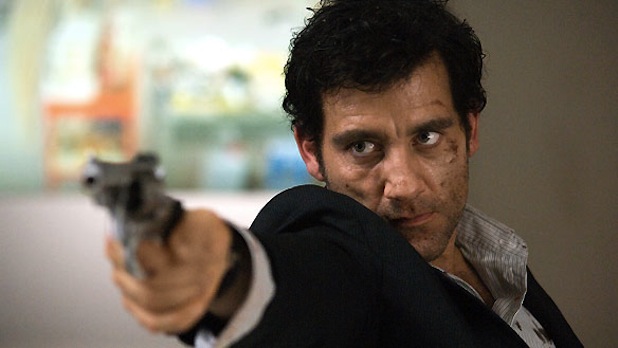The International (2/13/2009, directed by Tom Tykwer, who formerly directed Run, Lola, Run) is a large, looming, clean, general term that evokes intrigue and broadened horizons for high minds. The movie upon which the term is bestowed, though, unfortunately teases out none of these descriptors. In fact, the 2009 film, starring Clive Owen (as Interpol agent and protagonist Louis Salinger) and Naomi Watts (New York City Assistant District Attorney) downplays this intrigue and does not do so in dramatic or provocative fashion. It wastes a huge opportunity for a true exposure.
The premise of the film is the denunciation, through a story of a fight for justice in a world controlled by financial transactions and power plays, of the monumental force of an international bank, namely the Brussels-based International Bank of Business and Commerce (IBBC). The denunciation is not the least compelling when the cinematic storyboard is displayed to the viewer. No action, no thought-provoking dialogue, and, for the most part, no Hollywood superhero action. This last point is discredited by about 2 percentage points because there was a fantastic shootout scene at the Guggenheim. Still, even if violence was not the emphasis, there was not enough of it. This is important when the concept is boring, incomprehensible, or incredible to the majority of Americans.
To be sure, I was really looking forward to this cinematic artistic endeavor. With all of the intrigue and complexities of the international banking system: the offshore accounts; the multiple law enforcement and espionage agencies involved in exploration and due diligence (somewhat hypocritically at times); the multiple corrupt centers of power, especially Western power, dotting the globe; and the large amount of intelligence, craft and power that it takes to combat such a force with any degree of efficacy. All of these elements were mismanaged and perversely emphasized in this film.
If this review sounds confused so far, it is. Probably because this film did nothing! And although there is a sense of order in nothingness and nihilism, it is certainly not quantifiable, thus logically rendering it impossible to rationally order. Truly, The International seized a hot topic and destroyed its potential. A hot topic, and a truly important topic—squandered. No doubt, the topic was squandered so badly that no one else will likely take it on in the near future. I hope somebody does.
The plot progresses as follows; pay attention! this may put you to sleep: Clive Owen poses as a former Scotland Yard officer-turned-Interpol agent. Interpol I learned (from the film) has no planning or enforcement authority. It is merely an evidence-gathering agency, according to the script, unable to make arrests and storm the fort of international financial terrorists. So from the outset the protagonist is impotent.
Later on Mr. Owen, acting as Louis Salinger, exhibits a straw man concept of a seemingly naïve believer in the legal frame to fix the international banking system by striking at the heart of its operation through the rule of law. He consequently partners with Manhattan Assistant DA Eleanor Whitman. The straw man is easily proven wrong when one of the banks main arms-dealing bosses, Armin Mueller-Stahl, playing Wilhelm Wexler, properly educates the former Yard man, Salinger, that the rule of law is sort of controlled by the banks. Hallelujah!
Agent Salinger procured Wexler when an NYPD cop caught up with Wexler, the wise man of the banksters, through a nasty shootout with the banks seemingly infinite supply of hired muscle. The rain of bullets and gun fire juxtaposed with deafening silence went down at the Guggenheim. It proved to be an action piece that was a fresh moment in the movie—and allowed Salinger to prove his mettle in modern battle. It was also an anticlimactic climax.
So Agent Salinger attempts to take the law in his own hands by breaking up the bank from the inside, but he fails, sort of. He succeeds in using Wilhelm to steer internal meetings off course, but in the end can’t catch up with the bad guys and punish them or bring them to public justice. So the other bad guys who were originally going to do a deal with the banksters “got to” the bank’s leadership first—purely out of revenge.
In the end, the vengeful and efficient killing of then-key members of the IBBC does nothing to stop the bank, as the movie in the end demonstrates. New men take charge of the institution (demonstrated by newspaper clippings), and the world domination via financial levers marches aggressively onward, its agenda vindicated and moving forward without restraint. No explanations are provided, and no answers or great leaps of philosophy are suggested. You will see no evidence of greatness in script, language or action in this film’s supposed climax.
On the positive side, there are some breathtaking cinematic shots of dazzling European state capitals and flagship cities. Humorous moments for the high brow crowd are few and far between. Any other hilarity is spared in its entirety. The International is not one to wait for on DVD. It may prove, however, to serve as one of the many unexpected cures for insomnia for the average consumer on cable.



